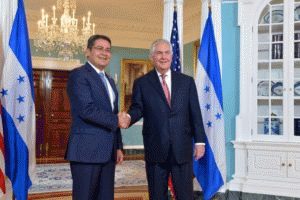From Consortium News

U.S. Secretary of State Rex Tillerson meets with Honduran President Juan Orlando Hernandez, at the Department of State, March 21, 2017.
(Image by [State Department photo/Public Domain]) Details DMCA
For weeks following its stolen election, the corrupt right-wing, neo-fascist government of Juan Orlando Hernandez in Honduras has been terrorizing its people. Street protests and spontaneous blockades have been met by extreme violence. Dozen have already died on the frontlines and many more have been arrested and brutalized in detention, while often being held incommunicado.
I spoke to Jesse Freeston, who has been based in Honduras for the last eight years working as a video-journalist and documentary filmmaker, ever since the US supported/Hillary Clinton sustained 2009 coup d'e'tat that purged the duly elected president, Manuel Zelaya. Freeston, who has reported for the Real News Network and Democracy Now en Espanol, is the producer of the feature documentary "Resistencia: The Fight for the Aguan Valley."
Freeston reports that, among other crimes against the people, "this regime has: stolen an election; ignored calls from the Organization of American States to hold a new election; passed a law prohibiting the prosecution of all former and current members of Congress in the midst of a series of massive corruption scandals [and has] appointed a new national police chief who has clear evidence against him of drug trafficking..."
I spoke to Freeston on February 7.
Dennis Bernstein: We continue our drumbeat coverage of Honduras and the recent stolen election there, an attempt to suppress the will of the people who, by all accounts, want to have a more progressive government. It has been a very violent situation since the election. We are hearing that dozens of people have been killed and that the atrocities being perpetrated by the government have resulted in a nightmare. Could you put this in the context of the last two recent election cycles in Honduras?
Jesse Freeston: On June 28, 2009, there was a vote on a non-binding resolution put forward by President Manuel Zelaya, who had taken up the call of various indigenous groups in the country to rewrite the constitution. When people went out to vote on that day, the military staged a coup d'etat and Zelaya wound up in Costa Rica.
This led to the most organized national resistance movement Honduras has ever seen. Assemblies were held, which brought together all these people who stood to gain from a new constitution. Just about every sector of the society were represented, except perhaps the oligarchy.
This led to the formation of the Libre Party, which participated in the 2013 elections [with Manuel Zelaya's wife, Xiomara Castro, running as the party's presidential candidate]. The election was officially won by Juan Orlando Hernandez but there was massive fraud. The November, 2017 elections were even more of a farce.
Despite all that, when the electoral tribunal released its first results, the Oppositional Alliance were up by 5% with 60% of the votes counted. One of the magistrates on the tribunal described it at the time as an "irreversible trend." Then, counting stopped for over a day when the computer system supposedly crashed. When it was back up again, the tendency had completely flipped and Hernandez ended up winning by one percentage point.
This led to another massive uprising. On one day of action there were 48 blockades of highways and major boulevards in the country. During the last two months, this has been happening a couple times a week.
Even international observers such as the European Union Commission and the Organization of American States -- who have been discredited here after turning their back many times in the last eight years to the crimes of this regime -- even they have said that they have to redo the election or there has to be a recount.
Nevertheless, the members of those organizations, like Canada, like the United States and the countries of the European Union, went ahead and validated the election.
DB: We have heard that activists and members of the resistance have been arrested.
JF: Yes, there are dozens of political prisoners behind bars right now. One of the most worrying cases is that of Edwin Espinal. He is someone who has consistently paid a price for his resistance against the ongoing coup d'etat.
(Note: You can view every article as one long page if you sign up as an Advocate Member, or higher).





